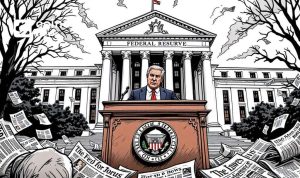- Main event, leadership changes, market impact, financial shifts, or expert insights.
- EU aims for zero-tariff agreement with US.
- Potential economic impact on EU and US trade.

Valdis Dombrovskis, European Commission Trade Commissioner, announced on April 11 that the EU has proposed a zero-tariff trade agreement to the United States to avert economic disputes.
Dombrovskis stated that the EU is prepared with countermeasures should talks with the US fail, aiming to avoid business damage and trade disputes.
EU Proposes Zero Tariffs to Ease Transatlantic Trade Tensions
Valdis Dombrovskis led the European Union’s offer to the United States proposing a zero-to-zero tariffs agreement. This initiative aims to avoid economic conflict and ease trade relations. If the agreement is unsuccessful, the EU has indicated a readiness to impose countermeasures to protect its interests.
Valdis Dombrovskis, EU Trade Commissioner, emphasized that “the EU proposed zero-for-zero tariffs with the U.S. to avoid economic harm and trade disputes,” stating that “the EU remains prepared to take countermeasures if negotiations fail”: source.
The potential failure of this proposal could result in economic losses for the EU, with GDP impacts estimated between 0.2% and 0.6%. The EU has prepared tariffs on various U.S. goods, valued at approximately €21 billion, if necessary. This includes agricultural products, which may significantly affect specific market segments if implemented.
Dombrovskis stated, “The EU remains ready to take necessary steps to protect economic interests.” This approach highlights the EU’s assertive stance amidst ongoing trade negotiations with the United States. If unresolved, the conflict could shift commodity prices and trade flows.
Historical Trade Disputes and Strategic Negotiation Approaches
The EU and US have experienced trade disputes, such as during the Trump administration’s steel tariffs. Past negotiations like the TTIP illustrate the complexity of transatlantic trade discussions.
Historically, the EU and US have engaged in multiple trade disputes, including tariffs on steel under the Trump administration. While past negotiations, such as the Transatlantic Trade and Investment Partnership (TTIP), have faced challenges, they provide a framework for current discussions.
Potential financial outcomes could impact global markets, with EU tariffs primarily targeting US industrial goods located in Republican-leaning states. Analysts note the strategic importance of these tariffs, suggesting a calculated negotiation effort by the EU.
Long-term diplomatic negotiations from both sides could stabilize market volatility if a compromise is reached. Trade experts emphasize the strategic nature of maintaining robust relations, given the significant economic interdependencies between these major economies.























